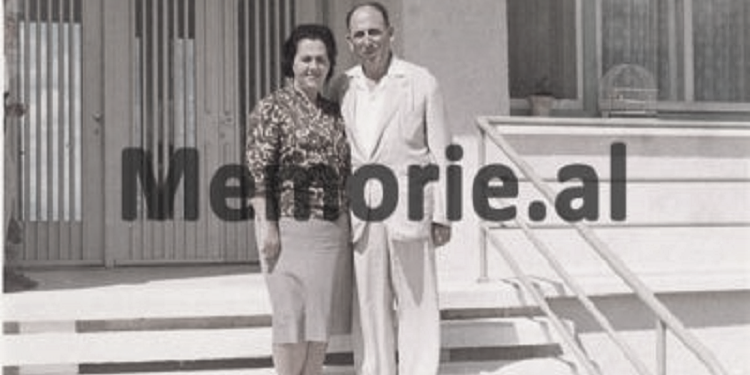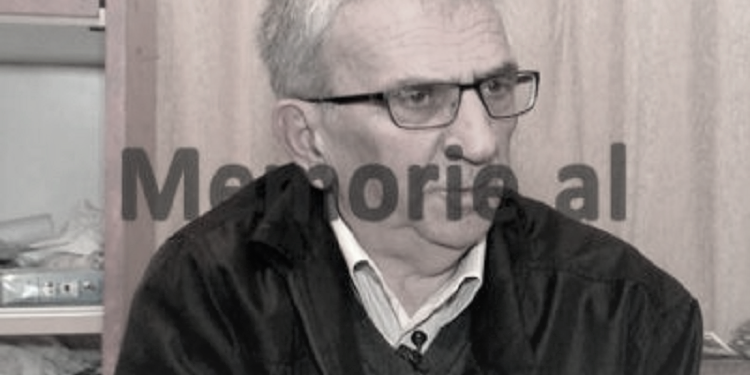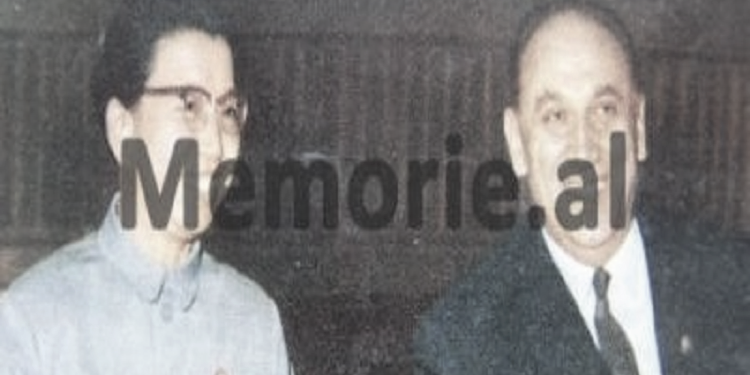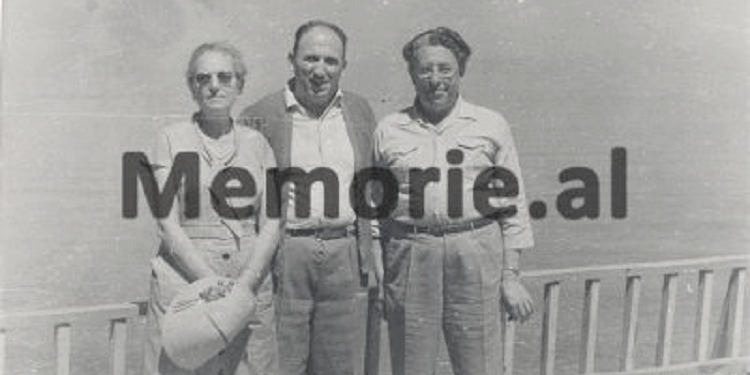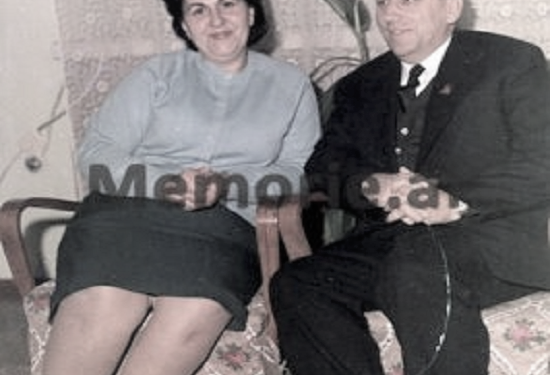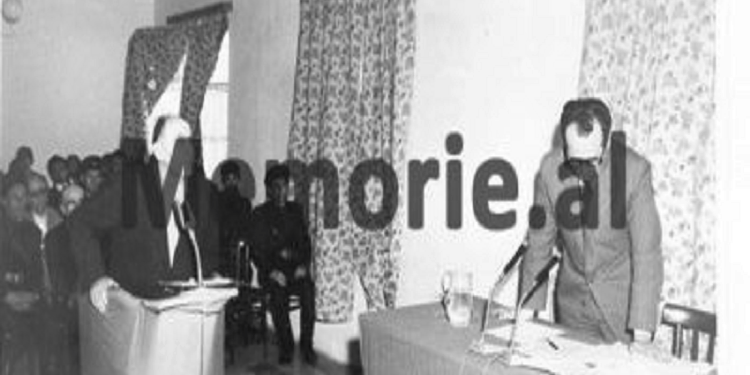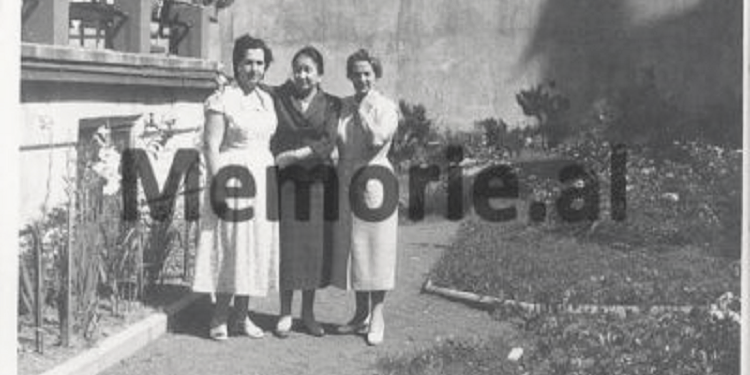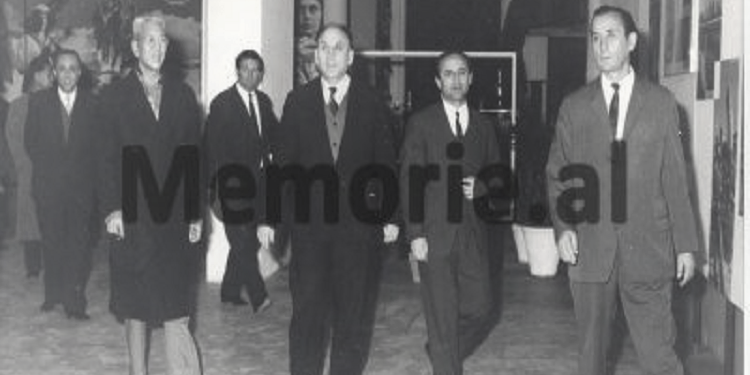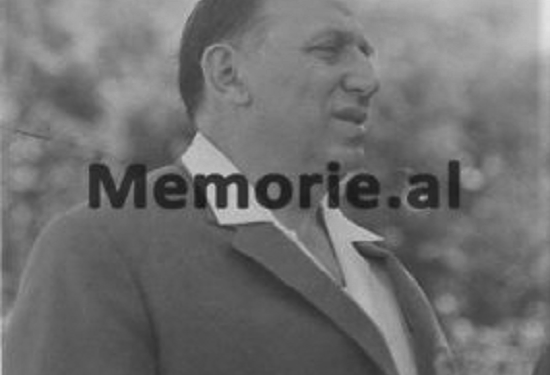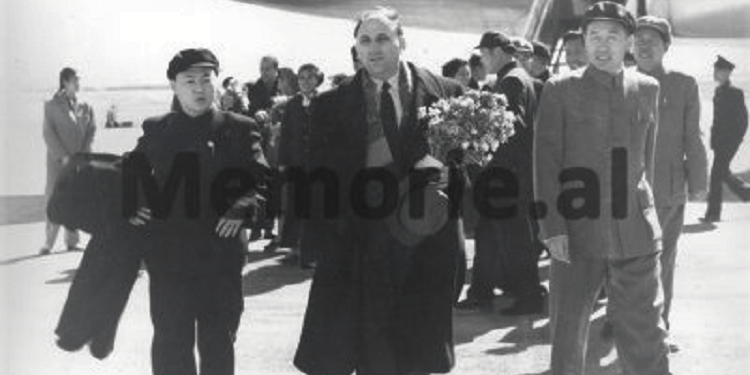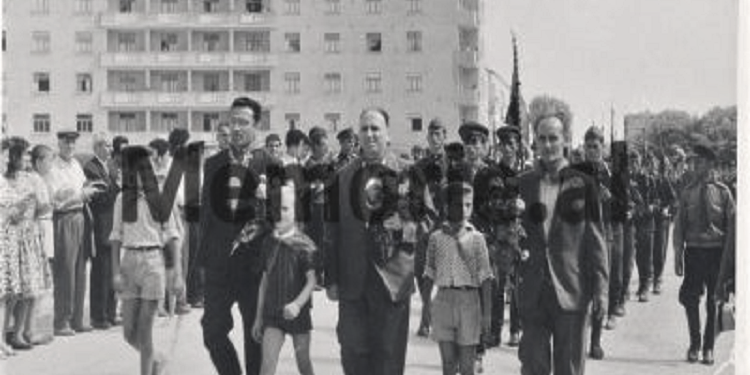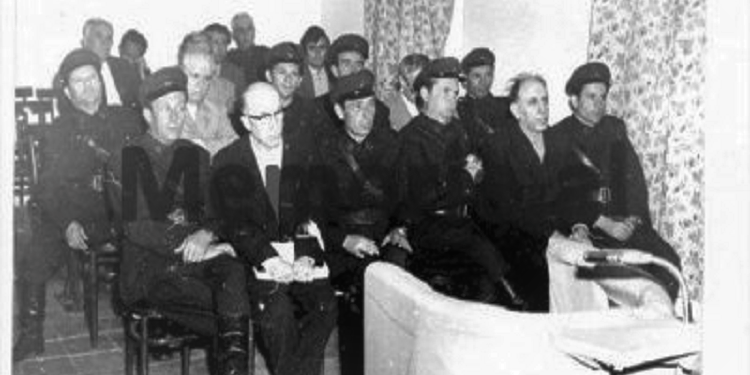Memorie.al publishes the unknown story of Abdyl Këllezi, a member of the Political Bureau of the Central Committee of the LLP, former Deputy Prime Minister of Albania from 1956 to 1965, Chairman of the Executive Committee of Tirana and Chairman of the State Plan, which was arrested in 1975 along with four of its close associates, Deputy Prime Minister Koco Theodhosi, Minister of Trade Kiço Ngjela and Minister of Foreign Trade Vasil Kati, accused of being “saboteurs and enemies of the people. ” The rare testimony comes from Leon Kelllezi, the second son of former Deputy Prime Minister Kelllezi (a graduate of Physics), who tells Memorie.al some unfamiliar events, such as his family’s official relations and relationships with Enver Hoxha’s family, the events that have taken place since the crackdown on the “sabotage group in the economy”, such as the one with Kadri Hazbiu who changed routes not to meet Abdyl, internment in Kot village and political conversations with his father, the mystery of the person who came and told him that after 10 days he would be arrested, at a collective meeting where it was announced that “Abdyl Kellezi and Koco Theodhosi had received the deserved punishment”, conversations with Thoma Deliana after the 90s over the accusation made to Abdyl that had wanted to build the railway with Montenegro, as well as the many vicissitudes of searching for the remains of the father, which have not yet been found …?
Mr. Leon, where is your father’s family, Abdyl Kellez, from, and what family did he come from?
We are originally from Tirana and my grandfather was Mehmet Muharrem Kellezi or Hoçi, as the old tyrants called him, and he was a merchant. Mostly it had the leather franchise and there were other shops, land and houses.
But where did my father go to school?
My father was born in 1919 and graduated from the Tirana Gymnasium, went on to study with the Turdiu family for genius, later to become a civil engineer. Went to Italy and made three years. When Albania was conquered, they were forced to take an oath in front of the Italian flag, where my father, along with everyone else, refused and was interned. In 1942 these internees were pardoned and he came to Albania. Upon arriving here, he immediately engaged with the movement and was arrested twice. He has reached out to the circuit secretary and has largely dealt with the Front. He arrived in Tirana on November 17, 1944, sent by the Communist Party and Enver himself, along with Pandi Kriston and Liri Belishova.
But what was it like after the war ended?
The father first dealt with the Democratic Front and later was appointed commissioner of the National Bank. He became governor of the bank and then in the ministry of finance and deputy minister. He worked for 11 months in the Ministry of Construction and then returned to the Ministry of Finance. After Stalin’s death, in 1953 he was appointed Minister of Finance. In 1956 he was appointed Vice-Chairman of the Council of Ministers until 1966. He then went on to chair the Tirana Executive Committee. In 1969-70 he returned to the prime minister, where he was appointed chairman of the State Planning Commission, until 1975 when he was arrested.
How do you remember, or more precisely, what do you know about the origin of the blow to your father, Abdyl Kellezi?
The story began with the oil problem, which was more closely linked to Koco Theodhosi. To me it is a wonder, because for the November holidays all these oils, like Lipe Nashi etc., were proposed and decorated. Immediately after the New Year, attacks on the Ministry of Industry began in January. My father was not bullied until May 3, 1975.
But what happened after May?
In May 1975, they were returning from a visit to the park in front of Kadri Hazbi’s old home, and when Kadri saw them, he changed his way. Then her mother said, “Abdyl, they will start with you tomorrow.” In fact with my father they were taken from May 3 to May 28 in daily meetings at the Central Committee in the Bureau and in government. Mostly Adil Çarçani defended it by saying that it is not Abdyl Kellezi’s responsibility. Also, Mehmet Shehu has protected him, he knows this well. On November 17, 1974, a meeting was held in Fier with all the oil experts who had contradictions. Koco Theodhosi was also present at that meeting. Later, father calls Mehmet Shehu on the phone and says: “Leave the gathering and come to Tirana, because the afternoon is the commemoration of the 30th anniversary of the liberation of Tirana. He contradicts a bit by saying how far these technical meetings have begun to break down. “Nothing – says Mehmeti – you’re coming.” When they returned, Koço told him that nothing was settled here. The father then makes two reports, one to Adil Çarçani and one to Haki Toska. Two months later he tells Mehmet Shehu: “Have you brought the relations to the Central Committee? – He’s saying this – I took it to Adil. “He knows I’ve read it,” he says. “But they say nothing has happened.” This is the story of why you did not lead. That letter was the same as that of the worker who sent Enver over the oil problems, that’s where the whole story began. This work took no more than three weeks.
What was said at those meetings?
They accused him of certain things, such as: that you made a proposal that in the Petroleum and Coal Industry was given some kind of independence to buy these equipment and this was called a kind of economic liberalization as in Yugoslavia, or as it was then said “Independent administration”.
But what happened to Dad after those meetings?
After the Plenum was over, they left for Kot village. After a couple of days, they told you that you had been appointed director of a farm in Kotë. It stayed for two months. He went to every brigade and made the presentation as a director. The next day he is summoned to the Tirana Executive Committee, where Mayor Ndue Marashi tells him that he will go to Kote village with his family. When we got there, we were given two rooms and a kitchen in the old palace. During that time, the father did not speak to anyone. After two months, they tell him that you have been fired and you have been assigned to distribute the fuel to the tractors, which he did quite correctly.
How do you remember the arrest of the father?
One day when I got home from work, a veterinarian told me I wanted to refuel. When Dad went, he was very late and was not coming while it was getting dark. The moment I would go out to find him, the door slammed on my back and the Vlora Interior Branch Director came in. I do not remember the name for the moment and said: “Abdyl Këllezi was arrested as an enemy of the people and left.” Then came 4-5 investigators who stayed from 7am until the next morning and did a thorough check. My mother was very upset and my brother Max was sick and I signed up for the gun, but I regretted not remembering to bring them in. Mostly they looked at the books. There were many books in Italian, French and Russian.
Did the father pre-empt this before the arrest, so did he pre-empt the arrest?
Yes, I remember a week before he was arrested, he goes to a villager where he worked and tells him; maximum after 7 or 10 days you will be arrested.
How is this explained, was it any provocateur introduced by Security?
Initially both the father and we doubted much about that person and what he said. But later we found out that he had been sent by a friend of his (his father’s friend) in order to be psychologically and emotionally prepared when the arrest really took place.
Who came to arrest Abdyl?
To arrest him was arrested P.D., who was also his investigator. I don’t know much about the trial, as I only know what Kiço Ngjela told me.
What did Kiço Ngjela tell you?
Kiço told me that for two years we were not confronted at all by the investigator. I’ve been told that as if Petro Taku had been presented with a document signed by Abdyli, which was a problem at the time, discussing which railroad to build first, the one from Greece or Yugoslavia! He also told me that the government of that time was divided into two groups, one part wanting to make the railroad with Yugoslavia and the other with Greece. And my father had this part of Montenegro for him, because it was easier, because with Greece it was more difficult, because he had to cross the Qafë-Plocea and so on. These are his words. And the accusation made to my father was that Abdyli had accepted and signed this thing, that is, the railway with Montenegro, because he wanted Yugoslavia to attack Albania by train. Understandably these are fitted things, but very thick, in a stupid word.
Let’s go back to your internment in Kotë, were you tapping?
One of our neighbors in Kota told us not to talk at home, as there were eavesdroppers because they had come and worked at home. The interceptors were artisanal rather than modern, such as those with wires going through the roof and passing to another palace, where the operative came and received the tapes. Knowing these, we were not talking about things that were known to hurt us.
Did your father, prior to his arrest, have any hope that he might even be forgiven and rehabilitated?
No, there was absolutely no hope. He understood that this work was over and had no hope of forgiveness, but still worked hard on the farm. It seems to pass the time and lose sight of what was expected.
How did he spend time after work?
He read the Voice of the People newspaper and nothing else.
Did you make any comments about the newspaper or news articles provided by Radio Tirana?
Even if we did, Dad would talk to me sometimes, while others who were younger than me didn’t open such conversations at all. I asked him about those in the People’s Voice newspaper, mainly the mainstream news, and he told me they didn’t get any help from China. But where do you understand, I asked, but here I read between the lines he was telling me. I once asked him, “How many years does Albania postpone with these economic opportunities?” He told me no more than ten years, if they don’t change it.
How do you remember your father’s sentence, how did you learn it?
They were convicted in May 1976, while a people meeting was held in August. At that time the head of the Vlora Interior Branch was Lambi Pecini, while his wife was the second secretary of the Party Committee and they were assigned to inform us about the conviction of the father. They seem to call and the brigadier comes and tells me that you will work with the woman. It was a vanity job and there was a guard in the wheat field, who told me that; if you call someone you will come, if not, then you will stay. The moment we leave, that guard tells my wife that you have forgotten something, and when she approaches, he tells you the news of the shooting. On the way she didn’t tell me, but she told me the terrible news at home.
Were they not formally communicated this way, as it was then in the employee collectives?
Yes, that’s how they communicated to us. We were informed that you were going to have a meeting, we went out a bit later and were standing in the building like a movie theater. The verdict was read saying that with so much decision, they were executed… and applauded, but not wholeheartedly.
Did any of the people speak after their execution was communicated?
Some were saying, “Long live popular justice” and so on. When we went out to smoke a cigarette, we were surrounded by some 20 young men who told us, “Now don’t move, because we will take you to the entrance of the palace and enter the house and today you will not go out into the village at all. lest any man provoke you. Not surprisingly for three days no one turned on either the radio or the television.
So those guys who accompanied you, but also the fact that the village didn’t turn on the radios and televisions, was a little support for you?
Yes, it definitely was not a bit. And I take this opportunity to thank you for all those people in that village and others who came to us in that very difficult time where we were.
We go back to your father, do you recall any other conversations you had with him, talking about political talk?
I recall a conversation when I told my father (Abdul) where Albania was going to go, because the economy was failing. And he has told me that Albania will never fall for politics, only the economy will sink. And I know why I’m going to be punished, I know even though you’ve been interned (he was talking about us, his kids). When the start starts, you will have a cash, but you will have neither home nor work!
Which meant ?!
I didn’t even understand where he wanted to go with those words he said to me, but I didn’t push him any further.
Where did you get hired when you went to internment in Kotë?
When we went to Kota, the big brother was assigned a plan in the commerce sector, I was assigned to the office, but I told him I could not do the job, and I was introduced to agriculture. The woman started out as a teacher, while her younger brother, Star, was in construction and working on construction. To the end we worked in agriculture.
Going back to the period when you were still living in the leadership block in Tirana, have you ever had the chance to meet Enver Hoxha?
I don’t remember Enver Hoxha, but I only met him once on the beach in Durres. I was small and playing ball. Najmiya often came to us. Enver came to our house only after his father became a member of the Bureau and told him that you should not stay in this house anymore, as it is a noise. After that, Adil Çarçani told him to come here to the adjacent house, since we had it empty and so we passed there.
What does anything special remind your father of Enver?
I remember my father once telling me about Enver Hoxha that he always, when he had to give a job or job problem, only called for his subordinates and never two or more together.
Going back in time, after the execution of your father, Abdyl Kellezi and Koco Theodhosi, two years later Hysni Kapo died, about whose death after the 1990s there were many doubts. How would you comment on this?
My guess is that Hysni Kapon was also eliminated because I see that every two to three years there was an execution by Enver’s closest associates. Thus in this logic of events, two years after Hysniu, Mehmet Shehu killed himself. Because Hysni Kapo and Mehmet Shehu were two cadres who had a great influence in Albania, because they also had many of their own people throughout the state structure. That road apparently resolved until he died in ’85. After ’85 they started to deal with some small things, not bullshit, not bullshit.
Who do you mean when you say that “they have solved this path”?
What about Enver, Najmiyah, Ramiz, who else ?! They decided on everything.
But after the ’90s, did you ever have a chance to talk to any of your father’s friends, Abdul, about why the stroke happened to them?
I asked Thoma Deliana a lot, who told me that with Koco, with Abdyl, with Pirro Dodbiba, we discussed a lot that we had these key areas of the Prime Minister’s Office. We were tapped, he said. Not that we cursed the Party, but we discussed how the economy problem could be solved.
Can you briefly tell us about your post-90s dad’s bones quest?
As we came to Tirana from internment, the first thing we did was take an interest in finding the bones. A group was set up there in front of the Ministry of Interior with three people. I went and that officer brought me a log, it seemed to be out of date, that the plates were yellow and said he says here that Abdyli and Koco Theodhosi were buried in Shishtufina. After that, I immediately went to the cemetery, find the head of the cemetery, a young man, and tell him that here-here is the job. He told me I don’t know, but tomorrow I will call someone who has been here 30-40 years, has his home here in the village over the cemetery. Come at 9am tomorrow I go at 9am the next day and he tells me there is nothing here, don’t deal with that job. Here are some 120 nameless tombs. Throughout my life I have been able to verify 4-5 names, but they are villagers who have mistakenly killed, or died in, the investigator. I kept these names and left them to this young boy. I told him how the procedure was? Burials were after 12 noon …
But until this time you went there, you had no clue where Koco Theodhosi’s father and father might have been buried.
I had been told something since I was in the village of Kote. A young man we worked with told me he had his own uncle at the Interior Ministry. The day I left and met those at work and would come to meet him, he tells me, “I didn’t tell you anything, it’s a painful thing, but they buried them in a tunnel and blew them up.” I did not believe this and tell him that I also have doubts.
But after that grave guard’s negative response, did you continue to search?
Definitely, in 1996, by the end of ’96, ie. it may have been a couple of months before the end, Idriz Seiti himself approached the veterans, who was the guard commander with these firing squads and told me you would come by car, you would find me at the Archbishop, if there were no other people . Idrizi also said that before the shooting, four places were designated as burial grounds, two were near Tirana and two were far away. Now we will see them all. He had all the A, B, C, D notes.
Had Idriz attended their funeral?
At the burial I hadn’t been told, but I heard from those who buried him buried near Tirana, and the first day he took us to the Arab Hotel, where there was a nursery with mimosas.
Were there any signs that they might have been buried there?
Idrizi told us that as far as I know, here he is buried in an unpaved tunnel with two pockets. In the front pocket from the middle are buried. We walked after him and in many places he did not stop. In one place it stopped. There was one like a big pile and I stumbled across that pile and I doubted it was true that they had blown it up.
And what did you do after that?
We checked in, from there to the Tractor Plant, we all checked it out. Check it yourself told us. And I, along with my brother, Star, searched up to the division where the Institute of Nuclear Physics is. As I was working at the Institute of Physics, along with a former officer working there who told me right away I knew these places, we searched but found nothing. And to this day we haven’t found anything either. Memorie.al




